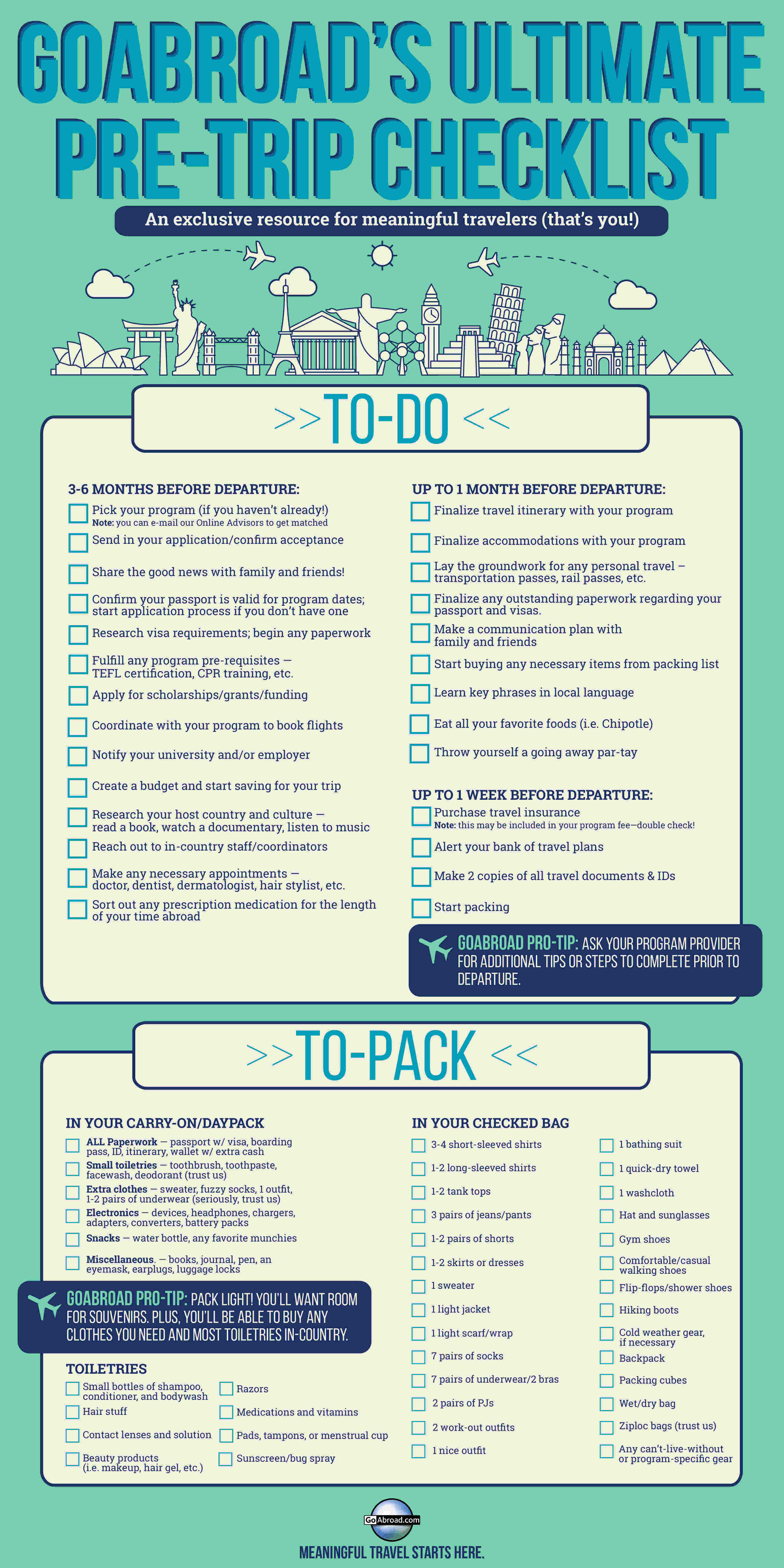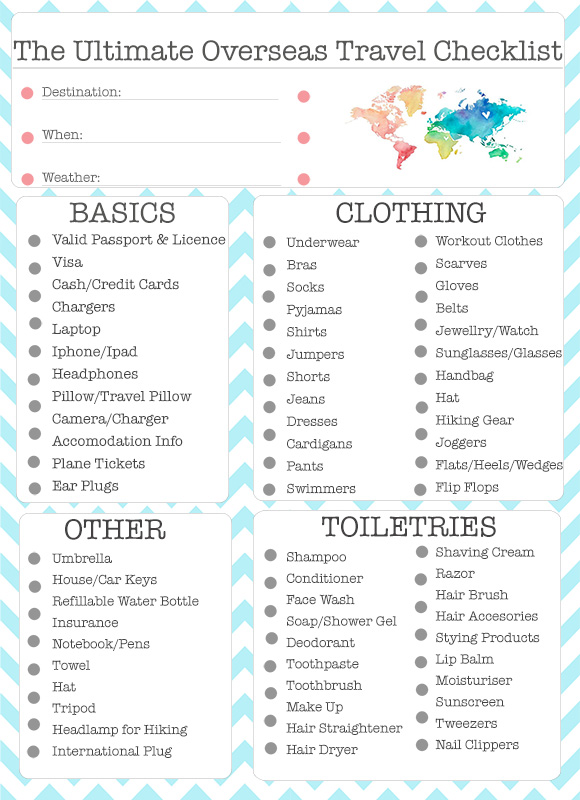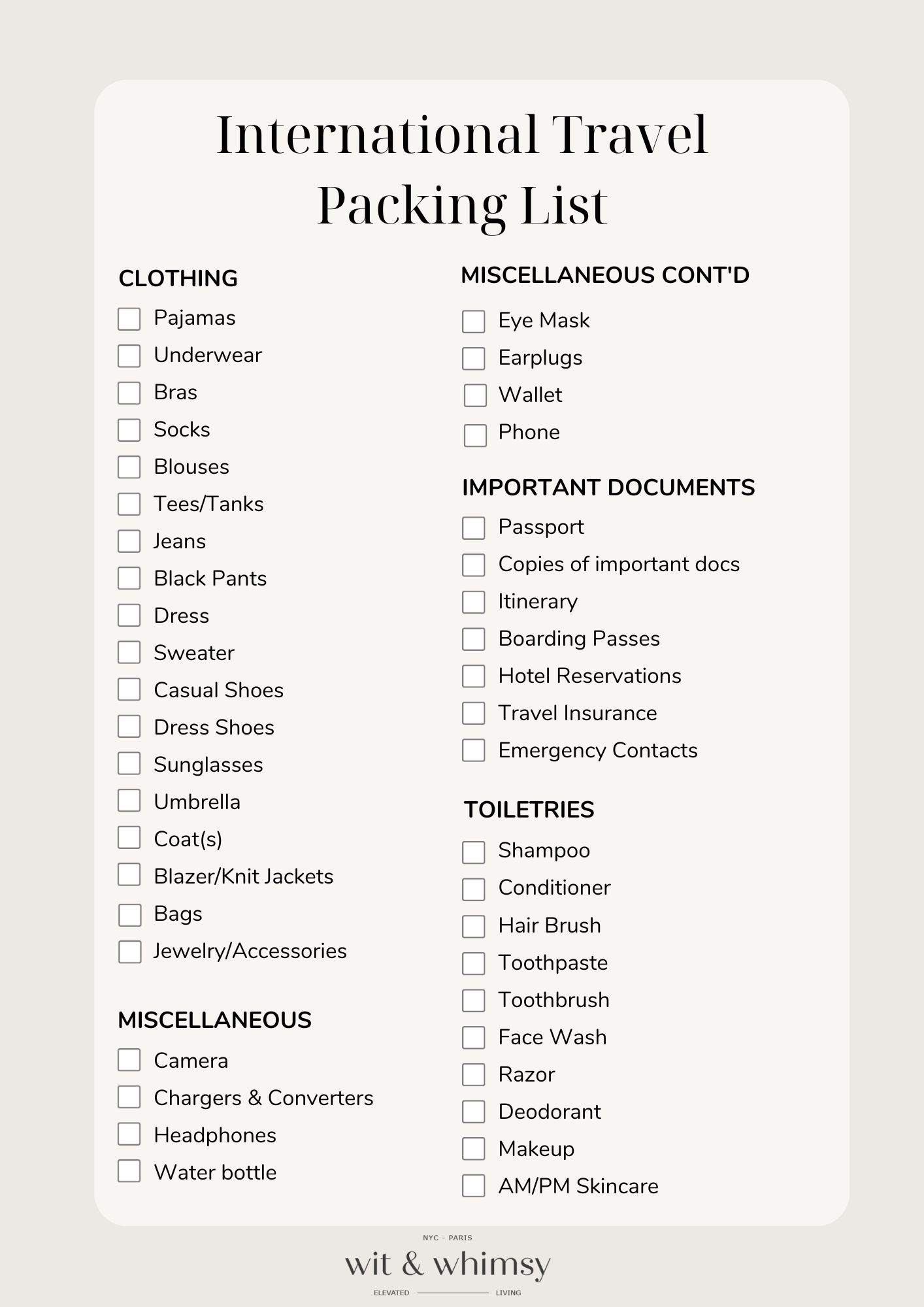Ultimate Travel Overseas Checklist: Your Complete Guide
Traveling overseas can be an exciting adventure, but without proper planning, it can also become stressful. Whether you’re embarking on a business trip or a leisurely vacation, it’s crucial to have a checklist to ensure nothing is overlooked. This comprehensive travel overseas checklist will guide you step-by-step, covering everything you need to prepare for a smooth and enjoyable journey.
1. Passport and Visa Requirements
Before anything else, make sure your passport is valid for at least six months beyond your travel date. Most countries require this for entry. If you don’t have a passport, you’ll need to apply for one well in advance.
Some countries also require a visa for entry. Research the visa requirements for your destination. You can apply for a visa through your country’s embassy or consulate. Keep in mind that some visas take time to process, so it’s important to apply early.
Pro Tip:
Use this passport checklist to ensure you’ve got everything covered.
2. Flight and Accommodation Bookings
Booking your flights and accommodation well ahead of time can save you both money and stress. Use reputable booking platforms like Skyscanner for flights and Booking.com for accommodations. Double-check your travel dates, flight times, and hotel reservation details before leaving.

Important Tip:
Ensure that your accommodation is in a safe location and accessible to tourist attractions or business venues.
3. Currency and Payment Methods
Understanding the currency used in your destination is essential. You may want to convert some of your home currency into local money before your departure. However, you can also rely on ATMs abroad for cash withdrawals.
Credit cards and travel money cards are widely accepted around the world. It’s a good idea to inform your bank of your travel plans to avoid any issues with card usage abroad.
Tips:
- Carry a small amount of local currency for immediate expenses like taxis or tips.
- Use a travel-friendly credit card to avoid foreign transaction fees.
4. Travel Insurance
One of the most important things to include on your overseas checklist is travel insurance. Whether it’s coverage for medical emergencies, trip cancellations, or lost luggage, having travel insurance can save you a lot of trouble if the unexpected happens.
Ensure that your policy covers all aspects of your trip, including health care, cancellations, and lost baggage. Research well to find the best plan for your travel needs.
Recommended Insurance Providers:
5. Health and Medical Preparations
Before traveling abroad, check if you need any vaccinations or health precautions for your destination. Visit a travel clinic or your doctor to get any required shots well in advance.
Also, make sure you pack essential medications that you may need while abroad, especially if they’re prescription-based. Always carry a doctor’s note in case of customs checks.
Health Tips:
- Pack a first-aid kit with basic supplies like pain relievers, bandages, and antiseptic cream.
- Consider travel-friendly health apps to track your health abroad.
6. Packing Essentials
When it comes to packing for your overseas trip, it’s easy to overpack or forget important items. Here’s a basic checklist for your suitcase:
- Clothing: Choose versatile items that can be mixed and matched.
- Toiletries: Toothbrush, toothpaste, deodorant, shampoo, conditioner, etc.
- Chargers: Don’t forget adapters for foreign power outlets.
- Important Documents: Keep a copy of your passport, visa, and any other relevant paperwork.
Here’s an image that might help in visualizing your packing strategy:

Packing Tip:
Pack your clothes in layers to save space and adjust easily to varying temperatures.
7. Mobile Phone and Connectivity
Before traveling, check with your mobile provider to see if they offer international roaming. Alternatively, consider purchasing a local SIM card or an international data plan to stay connected. Many countries also have Wi-Fi hotspots in airports and cafes.
Having access to a reliable internet connection can be a lifesaver for navigation and staying in touch with family and friends.
8. Emergency Contacts
Create a list of emergency contacts that you can easily access in case of any problems. Include:
- Your country’s embassy or consulate contact details.
- Local emergency numbers for police, ambulance, and fire departments.
- A trusted friend or family member’s contact info.
Save these numbers both digitally and in paper form for easy access.
9. Local Customs and Laws
Every country has its own set of laws and customs that you should be aware of. Research the local etiquette and cultural norms, especially if you’re traveling to a place with significant differences from your own country.
Understanding the do’s and don’ts can help you avoid embarrassing situations and show respect for the local culture.
Helpful Resources:
10. Final Check: Miscellaneous
Before you leave, do a final check for things you may have missed. Here’s a quick checklist of additional items to consider:
- Backup credit cards and IDs: Always have more than one method of payment.
- Snacks and water: Stay hydrated and have some snacks in case of delays.
- Entertainment: Download books, movies, or apps for long flights or layovers.
Don’t Forget:
Ensure you have a power bank for emergencies, especially during travel delays.

FAQs
1. Do I need a visa to travel overseas?
It depends on the country you are visiting. Always check the visa requirements for your destination well in advance. Some countries offer visa on arrival, while others require you to apply before your trip.
2. How far in advance should I book my flight?
It’s recommended to book flights at least two to three months ahead of your trip. Booking early can help you secure the best rates and availability.
3. What should I do if I lose my passport abroad?
If you lose your passport overseas, contact your country’s embassy or consulate immediately. They will guide you on how to get an emergency passport or travel document.
4. How much cash should I carry?
Carrying a small amount of local currency (around $50-$100) is sufficient for minor expenses. Use credit or debit cards for larger transactions to minimize carrying too much cash.
Conclusion
With this ultimate overseas travel checklist, you’re ready to face any challenges that come with international travel. From passports to packing, insurance, and emergency contacts, covering all your bases in advance will give you the peace of mind you need to enjoy your trip fully.
Safe travels and happy exploring!
